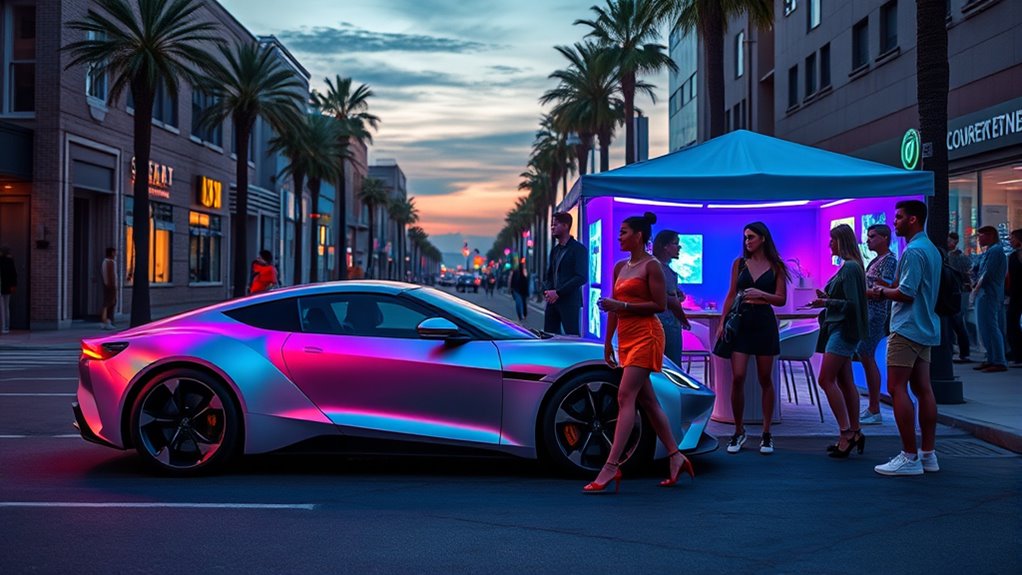To capture Gen-Z, luxury brands need to rethink how they showcase their values and craftsmanship. Focus on authentic digital engagement through TikTok, Instagram, and social commerce. Highlight sustainability, ethical sourcing, and transparency to build trust. Use real-time interactions and influencers to create a sense of immediacy and exclusivity. If you want to learn how to effectively refresh your approach and truly connect, keep exploring what it takes.

As Gen-Z enters the luxury market earlier than previous generations, brands must adapt to their unique preferences and behaviors. You’re likely to purchase your first luxury item around age 15, a few years earlier than Millennials did. This means brands need to engage with you at a younger age, understanding that your standards for quality, ethics, and exclusivity are shaping your buying habits from the start. Today, about 40% of luxury consumers are under 40, and your cohort’s influence is reshaping market trends. You prioritize sustainability and ethical practices, often choosing brands that demonstrate transparency and social responsibility. Limited editions, vintage pieces, and items with a story are especially appealing because they offer a sense of uniqueness and exclusivity that you crave. The secondhand luxury market is booming, driven by collectors seeking authenticity and history, which aligns with your appreciation for sustainability and value.
Gen-Z starts buying luxury at 15, shaping trends with a focus on ethics, sustainability, and exclusivity.
Your purchase behavior reflects a discerning mindset. You buy roughly 16 luxury items annually, slightly more than Millennials, but you’re more cautious due to rising living costs. You look for high-quality pieces that last rather than quantity, and sustainability influences your choices heavily. When it comes to online shopping, you’re hesitant to make high-value purchases without secure payment options, with 62% of luxury Gen-Z shoppers expressing concerns over online fraud. To address this, luxury brands are adopting more secure, flexible payment methods like Pay by Bank, aiming to create seamless, trustworthy shopping experiences that extend beyond just the product. Digital engagement is crucial, as your interactions with brands increasingly occur through social media platforms and innovative online tools.
Social media is your gateway to luxury. Over 45% of your luxury purchases start on platforms like Instagram, TikTok, or WhatsApp, with nearly 30% completed within social apps. You prefer shopping through shoppable reels, livestreams, and direct links, valuing real-time customer service and one-click purchasing. Influencers play a significant role, turning engagement into direct sales, which has shifted luxury marketing toward more interactive, social commerce-driven strategies. This approach caters to your desire for immediacy, authenticity, and personalized experiences, helping brands capture your attention quickly.
Sustainability isn’t optional; it’s essential. Over 60% of your peers cite eco-friendly practices as a key factor in purchasing decisions, even willing to pay premiums for transparency and ethical sourcing. Brands now use blockchain, digital passports, and resale initiatives to prove their supply chain integrity. Circular economy models through platforms like Vestiaire Collective or The RealReal are particularly attractive, aligning with your preference for eco-conscious consumption. Eco-friendly packaging and carbon-neutral shipping are expected norms, reflecting your holistic view of the luxury experience. For you, sustainability has become a baseline, not a bonus, shaping how brands must present themselves to stay relevant and trusted in your eyes. [Your generation’s awareness of environmental issues directly influences the brands you support and the stories they tell.
Frequently Asked Questions
How Can Luxury Brands Incorporate Sustainability to Attract Gen-Z?
You can attract Gen-Z by integrating transparency about your sourcing, production, and labor practices, showing your commitment to ethical supply chains. Use innovative, eco-friendly materials and promote circular fashion options like secondhand or refillable products. Share authentic storytelling about your sustainability efforts, emphasizing purpose and social justice. Focus on delivering high-quality, durable items, and guarantee a seamless, transparent buying experience that builds trust and loyalty among this environmentally-conscious demographic.
What Digital Platforms Are Most Effective for Engaging Gen-Z Consumers?
You’ll find TikTok, Instagram, and Discord are your best bets for engaging Gen-Z. TikTok’s quick videos and influencer collaborations catch their attention fast, while Instagram’s shoppable posts and luxe aesthetics appeal to their desire for exclusivity. Discord’s private communities foster authentic conversations, and social commerce on resale platforms aligns with their sustainability values. Use AR and VR to create immersive experiences, making your digital presence irresistible and memorable.
How Does Social Responsibility Influence Gen-Z’s Luxury Brand Loyalty?
Social responsibility greatly influences your loyalty to luxury brands. When brands demonstrate genuine commitment to sustainability and ethics, you’re more likely to trust and stay loyal to them. Transparent, authentic messaging on social media reinforces your connection, especially if their actions align with your values. If a brand neglects social responsibility, you’re quick to switch, as your loyalty depends on shared principles. Brands that prioritize social good build long-term relationships with you.
What Role Does Personalization Play in Appealing to Gen-Z Shoppers?
Personalization is essential in appealing to you because it makes your shopping experience feel unique and tailored to your preferences. You’re more likely to buy from brands that offer customized products, recommendations, and seamless digital interactions that reflect your identity. When brands use AI and data to understand your needs and values, it builds a stronger emotional connection, making you feel valued and increasing your loyalty to their luxury offerings.
How Can Luxury Brands Balance Exclusivity With Accessibility for Gen-Z?
Think of balancing exclusivity with accessibility as walking a tightrope—you need precision and finesse. You can offer limited-edition pieces and VIP experiences that feel rare, while also providing entry-level products and approachable digital content that invite younger consumers in. Transparency about your efforts in sustainability and ethics builds trust, making luxury feel both special and inclusive. This harmony keeps Gen Z engaged without diluting your brand’s elite status.
Conclusion
To truly connect with Gen-Z, luxury brands must refresh their image, embrace authenticity, and prioritize sustainability. You need to listen, innovate, and adapt. You must be genuine in your storytelling, transparent in your practices, and bold in your creativity. When you do these things, you don’t just attract Gen-Z—you create loyalty, inspire trust, and build a future where luxury and authenticity go hand in hand. It’s time to evolve, engage, and excel.









